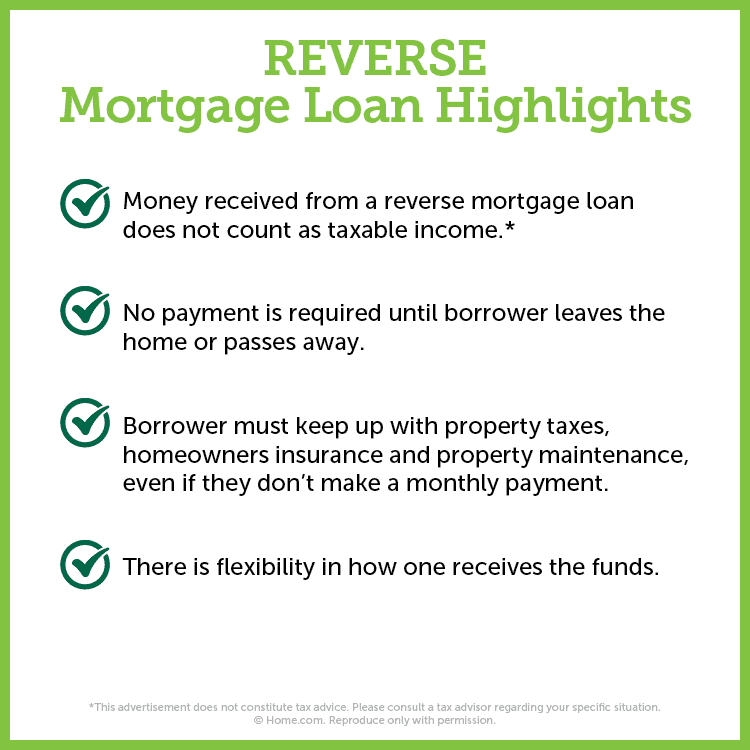The Process Involved When You Decide to Purchase Reverse Mortgage
Empower Your Retirement: The Smart Way to Purchase a Reverse Home Mortgage
As retirement approaches, lots of individuals look for effective approaches to improve their financial self-reliance and well-being. Amongst these strategies, a reverse home loan emerges as a viable option for property owners aged 62 and older, allowing them to touch into their home equity without the need of regular monthly settlements. While this financial device uses a number of advantages, consisting of enhanced cash circulation and the potential to cover crucial expenditures, it is important to comprehend the ins and outs of the application procedure and essential considerations included. The following actions may reveal how you can make a knowledgeable choice that can significantly affect your retired life years.
Recognizing Reverse Home Loans
Understanding reverse mortgages can be crucial for property owners looking for financial flexibility in retirement. A reverse mortgage is a financial item that permits eligible home owners, typically aged 62 and older, to convert a section of their home equity into cash money. Unlike traditional home mortgages, where debtors make monthly payments to a loan provider, reverse mortgages enable home owners to get repayments or a swelling sum while retaining ownership of their residential property.
The amount readily available via a reverse mortgage depends upon several variables, including the homeowner's age, the home's worth, and present interest rates. Significantly, the lending does not need to be settled up until the homeowner sells the home, relocates out, or dies.
It is necessary for possible customers to understand the effects of this economic product, consisting of the effect on estate inheritance, tax obligation considerations, and ongoing obligations connected to residential or commercial property upkeep, taxes, and insurance. Furthermore, counseling sessions with certified experts are frequently called for to guarantee that consumers completely understand the conditions of the loan. Generally, a comprehensive understanding of reverse home mortgages can empower house owners to make informed decisions concerning their financial future in retirement.
Advantages of a Reverse Mortgage
A reverse mortgage uses several compelling advantages for qualified property owners, especially those in retirement. This monetary device permits seniors to convert a part of their home equity right into cash, supplying essential funds without the need for monthly home loan settlements. The cash obtained can be utilized for different objectives, such as covering clinical expenditures, making home improvements, or supplementing retirement earnings, therefore boosting total economic flexibility.
One significant advantage of a reverse home loan is that it does not need payment till the home owner relocates out, markets the home, or dies - purchase reverse mortgage. This feature makes it possible for retirees to preserve their way of living and satisfy unforeseen costs without the concern of regular monthly payments. Additionally, the funds gotten are typically tax-free, permitting property owners to utilize their cash money without concern of tax obligation implications
In addition, a reverse home mortgage can provide peace of mind, understanding that it can serve as a financial security internet throughout tough times. Homeowners also retain possession of their homes, ensuring they can continue residing in a familiar environment. Eventually, a reverse mortgage can be a calculated funds, empowering retired people to handle their finances efficiently while appreciating their gold years.
The Application Process
Navigating the application procedure for a reverse home loan is an important step for home owners considering this economic choice. The initial stage involves reviewing eligibility, which commonly requires the homeowner to be at the very least 62 years of ages, very own the home outright or have a low home mortgage balance, and occupy the home as their key residence.
Once eligibility is confirmed, house owners should undertake a counseling session with a HUD-approved counselor. This session guarantees that they totally understand the ramifications of a reverse home mortgage, including the duties entailed. purchase reverse mortgage. After finishing counseling, candidates can proceed to collect required documents, including evidence of earnings, possessions, and the home's value
The following step involves sending an application to a lender, that will certainly examine the economic and property certifications. An assessment of the home will likewise be performed to establish its market value. If authorized, the lending institution will present finance terms, which should be evaluated very carefully.
Upon approval, the closing procedure follows, where final files are signed, and funds are paid out. Recognizing each phase of this application process can considerably improve the property owner's self-confidence and decision-making relating to reverse mortgages.

Trick Factors To Consider Prior To Getting
Purchasing a reverse home mortgage is a substantial financial choice that needs careful factor to consider of a number of key elements. Examining your economic demands and goals is similarly vital; figure out whether a reverse home mortgage aligns with your lasting strategies.

A reverse mortgage can influence your qualification for specific federal government benefits, such as Medicaid. By thoroughly evaluating these factors to consider, her response you can make an extra educated decision about whether a reverse mortgage is the appropriate economic method for your retired life.
Maximizing Your Funds
When you have secured a reverse home mortgage, properly handling the funds ends up being a concern. The flexibility of a reverse home mortgage allows home owners to use the funds in various ways, yet strategic preparation is necessary to maximize their advantages.
One key method is to create a spending plan that outlines your economic objectives and monthly expenditures. By determining needed costs such as health care, residential or commercial property tax obligations, and home maintenance, you can designate funds appropriately to guarantee lasting sustainability. In addition, take into consideration utilizing a portion of the funds for financial investments that can create earnings or appreciate in time, such as mutual funds or dividend-paying supplies.
An additional important facet is to preserve an emergency situation fund. Reserving a book from your reverse home loan can aid cover unexpected costs, supplying comfort and monetary security. Additionally, seek advice from a financial advisor to check out possible tax ramifications and how to incorporate reverse home mortgage funds right into this contact form your overall retirement technique.
Eventually, prudent monitoring of reverse mortgage funds can improve your economic protection, enabling you to appreciate your retired life years without the stress and anxiety of financial uncertainty. Careful preparation and informed decision-making will make sure that your funds function effectively for you.
Conclusion
Finally, a reverse home mortgage offers a viable economic method for senior citizens looking for to improve their retirement experience. By transforming home equity into obtainable funds, people can deal with vital expenses and safe and secure added funds without sustaining monthly payments. Cautious factor to consider of the linked implications and terms is important to make the most of advantages. Inevitably, leveraging this monetary tool can promote greater freedom and boost overall lifestyle during retired life years.
Comprehending reverse mortgages can be crucial for homeowners seeking economic versatility in retirement. A reverse home loan is a financial item that allows qualified property owners, typically aged 62 and older, to transform a section of their home equity right into money. Unlike traditional mortgages, where debtors make monthly settlements to a lender, reverse home loans enable homeowners to obtain settlements or a swelling amount while keeping possession of their home.
On the whole, a detailed understanding of reverse mortgages can encourage house owners to make enlightened decisions regarding their financial future in retired life.
Consult with a financial consultant to check out possible tax ramifications and how to incorporate reverse home loan funds into your general retired life technique.